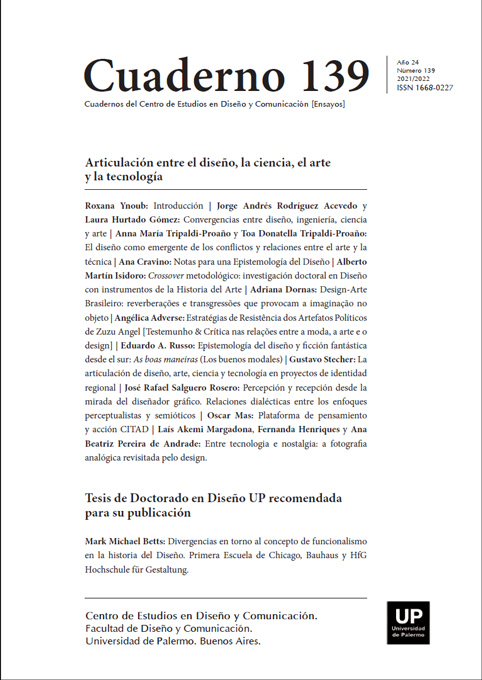El diseño como emergente de los conflictos y relaciones entre el arte y la técnica
Abstract
As a result of the industrial revolution, the machine replaces the human hand in manufacturing, this process is strongly criticized from various areas, one of them, the quality of the objects produced, the search for solutions aimed at solving this problem generates the debate on the industry-art relationship. Design emerges from this meeting, and with it, a series of reflections on the relationship between design, technique and art. This writing covers some historical discourses of Design regarding this relationship, including the ideas of important theorists such as Porset, Maldonado, Bonsiepe, Margolin and Buchanan. The writing concludes with a theoretical proposal that seeks, through some conceptual models, to bring to the contemporary this process of emergence between conflicts and relationships with art and technique, as well as showing how this journey defines the interdisciplinary relationship that Design establishes with these and other fields.
References
Beltrán, F. (2000). Towerd a history of Graphic Design. Interview with Victor Margolin. Foro Alfa, 4.
Bonsiepe, G. (1965). Education for visual Design. Journal of the Ulm School for Design, 12–13, 19–20.
Bonsiepe, G. (1968). Bauhaus Weimar Exodus 1. Journal of the Ulm School for Design, 21, 12.
Bonsiepe, G. (1982). El diseño de la Periferia. debastes y experiencias. (Calypso, Ed.). Mexico.
Bonsiepe, G. (2011). Diseño Y Crisis (Conferencia presentada en pcasión de la ceremonia de otrogamiento del Títilo Dr. honris causa. México: Universidad Autónoma Metropolitana.
Bonsiepe, G. (2012). Introducción al diseño industrial. In Diseño, arte, cultura y tecnología (1st ed., pp. 90–107). México DF: Universidad Autónoma Metropolitana.
Buchanan, R. (1985). Declaration by Design. Design Issues, 2, 18.
Buchanan, R. (2019). Systems thinking and design thinking: The search for principles in the world we are making. She Ji, 5, 85–104.
Campi, I. (2007). La idea y la materia. Gustavo Gilli.
Francisco, B. (2012). Algunos problemas de diseño. In Diseño, arte, cultura y tecnología (1st ed., pp. 66–73). México DF: Universidad Autónoma Metropolitana.
Maldonado, T. (1949). El diseño y la vida social. Boletín CEA, 2.
Maldonado, T. (1958). Nuevos desarrollos en la industria y formación del diseñador de productos. ULM, 2, 31.
Maldonado, T. (1977a). El diseño industrial reconsiderado. (G.G., Ed.). Barcelona.
Maldonado, T. (1977b). Vanguardia y racionalidad: artículos, ensayos y otros escritos 1946-1974. (Gustavo Gili, Ed.). Barcelona.
Maldonado, T. (2004). ¿Es la arquitectura un texto? y otros escritos. (Infinito, Ed.). Buenos Aires.
Margolin, V. (2016). Design Issues, 2(1).
Margolin, V. (2018). Las nuevas formas de diseño. Discurso de graduación en Maryland Institute College of Arte (MICA).
Porset, C. (1949). Expresión y utilidad de los objetos de uso diario. Revista Arquitectura, 29, 50.
Porset, C. (1953). Diseño viviente. Hacia una expresión propia en el mueble. Espacios, 15, s/n.
Salinas, O. (1992). Historia del diseño Industrial. México: Trillas.
Simón Sol, G. (2012). Esas modernas cajas negras del diseño industrial. In Diseño, arte, cultura y tecnología (1st ed., pp. 126–145). México DF: Universidad Autónoma Metropolitana.
Torrent, R., & Marin, J. (2005). Historia del diseño industrial. Cátedra Editores.
Los autores/as que publiquen en esta revista ceden los derechos de autor y de publicación a "Cuadernos del Centro de Estudios de Diseño y Comunicación", Aceptando el registro de su trabajo bajo una licencia de atribución de Creative Commons, que permite a terceros utilizar lo publicado siempre que de el crédito pertinente a los autores y a esta revista.


